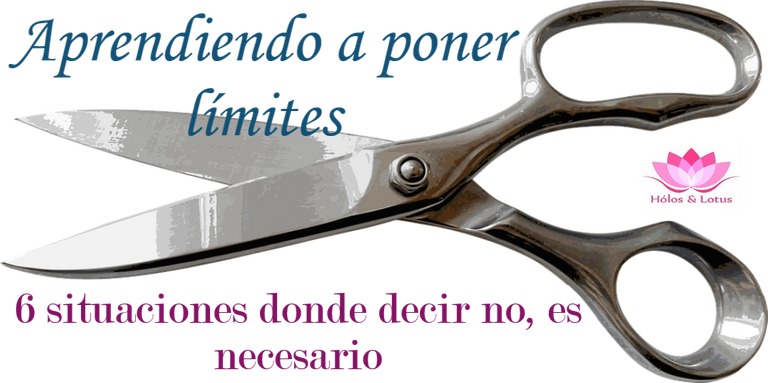

Nunca es tarde para aprender a decir no o para activar la negación ante circunstancias o acciones que, definitivamente, no nos ocasionan beneficios.
El bienestar depende, muchas veces, de negarnos ante determinadas circunstancias; pero aprender a decir no o activar lo que significa esa palabra, muchas veces es difícil y hasta nos cuesta gran parte de nuestra existencia lograrlo.
Por otro lado, nunca es tarde para aprender a decir que no, para activar negaciones necesarias en pro de nuestro bienestar; por lo tanto, para esta comunidad de C/Holos&Lotus, donde, además de las iniciativas, creamos contenidos prácticos y relevantes en pro de nuestro bienestar en todas las áreas de nuestra existencia, también se nos hace necesario dedicarle un tiempo al no, como palabra, como acto de fortaleza y como acción necesaria para nuestro crecimiento.

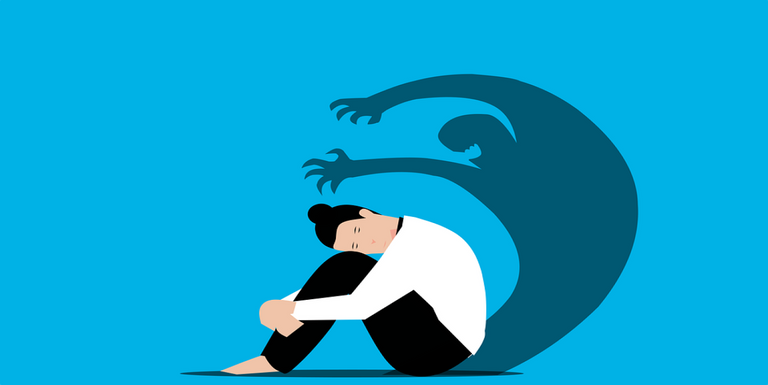
Nos cuesta, porque hay mucha presión externa
Y, es que tendemos a ser catalogados como personas negativas o egoístas, al imponer límites, al cortar con patrones y situaciones que nos obligan a apoyar aún en contra de nuestra voluntad.
Si decimos no en forma sistemática, es posible que lo entendamos de esa manera; sin embargo, negarse a peticiones que no deseamos o que simplemente no nos van a traer consecuencias positivas y, aún más, que no nos van a dejar absolutamente nada; sería lo lógico de actuar.
Esto es parte importante de la asertividad, que podemos ir implementando en nuestras existencias la imposición de límites correctos.
¿Cuántas veces terminamos haciendo cosas en pro del bienestar de otros que nos dejan sin sabores, confusiones, problemáticas, pérdidas de tiempo y hasta circunstancias difíciles, que a la larga, nos quitan tiempo para terminar de entenderlas y de resolverlas, simplemente porque no sabemos decir no?
Y no es solamente poner límites, contener ataques y situaciones que nos atrasen, es también, aprender a decir no en acciones que tenemos aprendidas y que no nos sirven o que no nos permiten seguir el camino de evolución que todo ser humano necesita, amerita o se merece.
Son muchos los miedos por los cuales retrasamos el accionar de las negativas o que no decimos no; y es porque pensamos que vamos a quedar mal, porque creemos que podemos dañar, porque tenemos miedo de dar mala imagen y hasta hacer sentir mal a otro ser humano en quien tenemos una imagen preestablecida.
Tenemos la creencia que, es de cierta altura complacer o agradar a las personas; pero, es importante entender, que no depende del complacer el quedar bien o agradar a los seres humanos.
Eso depende, única y exclusivamente, de nuestra forma de ser y de los valores que manejamos con nuestras palabras y actitudes.
La honestidad, por ejemplo; la educación, el respeto, la tolerancia y empatía hacia los demás, son características que hacen que una persona agrade; no la complacencia.
Probablemente, aún quedan restos de las estrictas formas en que nos educaron generaciones pasadas, y, por lo tanto, en forma prácticamente irremediable y automática, tendemos a complacer, a callar, a dejar de hacer cosas para nosotros mismos, a aceptar condiciones, a no transformar características de personalidad -aptitudes y actitudes- que deben ser transformadas.
Sin embargo, repito, nunca es tarde para aprender; y la importancia de poner límites, actuando sobre la base de valores y principios, social y legalmente aceptados, nos permite tomar decisiones más certeras, respetar nuestros valores y deseos, y, sobre todo, que esas decisiones vayan acordes con nuestras necesidades y en pro de nuestro bienestar.
Si bien, valoramos y amamos y, por lo tanto, respetamos, igualmente, con honestidad; estamos involucrando ambas acciones, el valorar y el amar al poner límites, al decir que no a nosotros mismos y a otros.
Enseñando el por qué no se acepta algo o alguna circunstancia puede ser una muestra definitiva de autoestima, de amor propio y de amor por el otro.
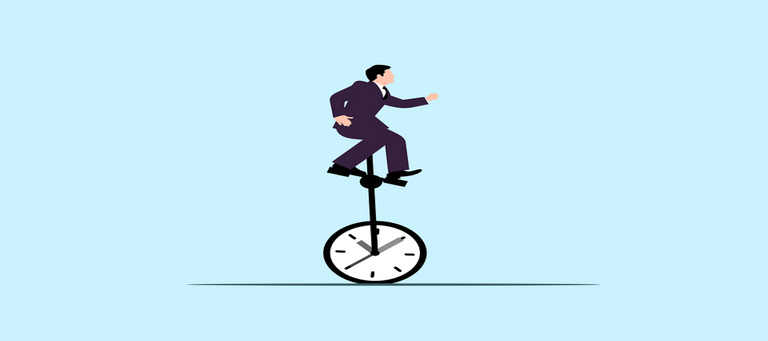
Se trata de fomentar la asertividad, que es equilibrio
Cuándo nos decimos a nosotros mismos y a nuestros malos hábitos que no, o a otro ser humano, en contra de la presión social o las razones culturales pre-aprendidas; contra alguna acción que no nos conviene, estamos hablando de aprender a comunicar derechos, expresar opiniones y de imponer posiciones ante la vida en forma honesta y clara.
Esto conlleva, obligatoriamente, a que tengamos un nivel de respeto por los demás, por el planeta y, sobre todo, por nosotros mismo.
Eso es asertividad: Entender que los derechos nuestros están a la misma altura de los derechos de los otros, y que, por lo tanto, yo no daño porque entiendo que ese daño también puede sucederme a mí.
Al hacer esto, entendemos, en forma amable y directa, que tenemos que defender nuestras posiciones.
Pero también está la contraparte: La ventaja de tener que trabajar nuestros miedos e inseguridades para lograr la imposición de límites.
Si algún ser humano, o los deseos de nuestro organismo y de nuestros gustos, que provienen de la publicidad y de un estilo de vida de moda, nos hacen sentir necesidad por complacer o por complacernos, esto no significa que estemos obligados a hacerlo.
Mucho menos a no razonar las consecuencias de elegir complacer a otro o complacer gustos impuestos desde el punto de vista social y por moda, y hasta a tomar elecciones porque simplemente otros la han tomado anteriormente o en masa.
Muchas vacas comen heno, pero esa no es razón para que lo hagamos nosotros.
Por todo lo anteriormente dicho, es importante, desde el punto de vista práctico, que estudiemos y analicemos estas 6 situaciones frecuentes y rutinarias, en las cuales él no, es sumamente necesario para nuestro bienestar:
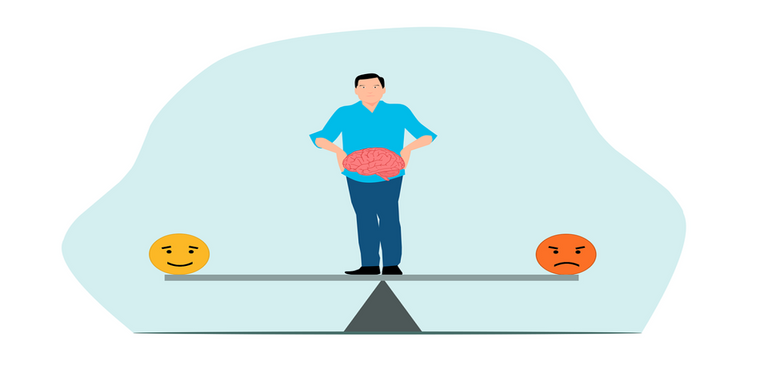
1.- No, a perder tu identidad
Bajo ninguna circunstancia, ni por impresionar a otros, ni por conseguir un empleo, ni por agradar a alguien, ni por alguna razón que en ese momento nos parezca válida; debemos demostrar ser lo que no somos.
Si alguien va a estar con nosotros, debe hacerlo con las características que poseemos y con nuestras condiciones de vida.
Si vamos a ocupar un cargo y a ser aceptados en ese puesto laboral, debemos lograrlo por nuestros conocimientos y por nuestra personalidad.
No hay nada más difícil que mantener un personaje actuándolo todo el tiempo.
Cuando comenzamos a transformar características de nuestra personalidad para agradar o conseguir un logro, terminamos enganchados en una serie de situaciones complicadas que van dañando progresivamente nuestras metas.
Representar papeles o cualquier papel, a la larga, éste va a verse agrietado por las verdaderas características de nuestra personalidad.
Siendo tú mismo, va a permitir que te respetes más y, en la medida en que esto ocurra, los demás te respetarán en función de los límites que establezcas -Laura Rodríguez, 04/11/2022 en: ¿Por qué es tan importante aprender a poner límites?-
Recordemos que puedes transformarte en la mejor versión de tí, no en lgo que no eres:
<Nadie nace predeterminado a ser sumiso, esto se aprende de forma paulatina, “sin darse cuenta”. No es una cuestión biológica ni hereditaria, es un comportamiento aprendido y, por lo tanto, modificable.>
Gualberto Buela-Casal
(Prólogo al libro de Walter Riso: Cuestión de Dignidad: El derecho a decir, no. Febrero 2002)
2.- No, al descontrol emocional
Si hay algo que el organismo pide y que tu psique pide, es libertad para expresar las emociones.
Esa serie de reacciones, ideas, sensaciones y sentimientos que ocurren producto de estímulos externos e internos, que cuando salen sin control, como le encantaría a tu mente; son capaces de meternos en muchos líos.
El control emocional debe ser uno de los objetivos de nuestro crecimiento.
El aprender sobre inteligencia emocional, saber cuándo reaccionar y cómo controlar las reacciones, para mantener tu posición, tus objetivos, tus metas y hasta tus silencios o planes fuera del alcance de la opinión de los demás, salvo de tu propia opinión y evaluación.
El control emocional es importante, porque estar a merced de las emociones implica echar a un lado el razonamiento, que es la base mediante la cual creamos objetivos, organizamos acciones y hasta formulamos metas con la finalidad de la consecución de todo logro.
3.- No, al exceso de gastos
Creo que las razones por las cuales debemos aprender a practicar él no, actuar él no, en estas circunstancias, las conocemos todos.
Pero, pareciera que siempre hay algo dentro de nosotros que nos dice que es posible, que lo hagamos, que hay financiación, que está la facilidad del crédito.
Aquí, si fuésemos bastante concretos, referente a lo que ganamos, a la distribución correcta de nuestros gastos, y tuviésemos la capacidad de invertir en lo que debemos invertir, como es en educación, en mentoría, en bienes, para mejorar nuestra calidad de vida; mucho estrés nos ahorraríamos.
Igualmente, tener una buena cultura del ahorro para asegurar momentos difíciles que podamos atravesar, o simplemente el futuro; entenderíamos que este es uno de los no, más importantes que tenemos que aprender a ejercer en nosotros mismos: El detener el gasto exagerado de dinero que no se tiene y el endeudarnos.
Sobran los porqués.
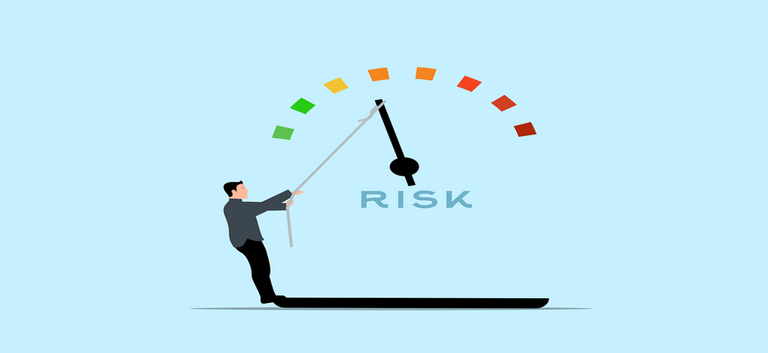
4.- No, al depender de alguien; así sea tu pareja
Formar en nosotros la mentalidad o cultura interior, de que somos responsables de nuestros actos, de nuestra formación, de nuestra especialización profesional, del servicio que prestamos; conlleva, irremediablemente, a que aprendamos a valorar nuestro trabajo y a cuidar la remuneración que recibimos por él.
Es verdad que cuando comenzamos a formar relaciones de pareja nos transformamos en equipo, pero, lo que no debemos pensar al formar uniones es en depender del otro.
Voy a ser muy claro según mi punto de vista:
Al juntar bienes para mejorar nuestra subsistencia comenzamos inconscientemente a co-depender; y esto trae consecuencias en nuestras emociones y conductas automáticas.
Estas consecuencias inconscientes son, la dependencia, la falta de libertad, el coartarnos de desarrollar ideas propias y el depender de otros para tomar decisiones concretas.
Por eso, aportar es más efectivo que juntar, a la larga.
Repito: Esta explicación es una opinión muy mía, muy propia; y está basada en numerosas entrevistas que, a nivel médico y en el área de psiquiatría, he podido observar; por lo tanto, entiendo que sea susceptible de ser rebatida.
Pero, a mí parecer, por mucho amor, compromiso y unión -y siempre defendiendo que la pareja debe ser un equipo- tanto la producción como la dependencia económica y afectiva, deben evitarse en una pareja o equipo.
Nunca se debe depender, ni de tu pareja, ni de alguien más.
5.- No, a la desvalorización o a regalar tu trabajo
Esto, primero, es como una prolongación del no, anterior; y se basa en lo que muchos hoy en día defienden con eso de que no regales tus conocimientos o tu trabajo.
En medicina he entendido que muchos médicos, que saben muy bien su profesión y que tienen una alta capacidad de servicio, que, de paso, ofrecen sus conocimientos y sus consultas en forma gratuita; tienden a ser menos valorados.
Hay cientos de artículos que hablan sobre eso (Lee, el de Gustavo Rubio: Regalar tu trabajo tiene graves consecuencias. Del 2 de diciembre, 2020) y solo por poner un ejemplo.
De todas formas, no es necesario colocar estudios científicos y estadísticas para entender que todo lo que le ha costado a un ser humano, en cuanto a tiempo y recursos económicos, su formación, debería ser suficiente razón como para que se entienda y se exija valoración de su trabajo.
6.- No, al dar siempre tu opinión
Un último no, por ahora, es: No te metas donde no te han llamado.
Y es esta una manera de ir creando en nosotros la precaución; que tiene dos puntos de vista bajo los cuales analizarse:
El primero es el respeto al albedrío del otro. Si no entiendes las decisiones y las acciones de otro ser humano, trata de estudiar o ponerte en su lugar para lograr entenderlas, o al menos tener un punto de vista parecido.
Eso, por un lado.
Y, por otro lado, trata o respeta las decisiones de cada quien, pues estas dependen de la experiencia y de las valoraciones que el otro haga; y cada vida, cada estilo de vida es diferente.
No podemos pesar y valorar el oro con base en las características de la plata.
Y la segunda situación bajo la cual podemos ver esto: Es que, generalmente, tendemos a confundir a los otros seres humanos con nuestras opiniones y sugerencias, por lo que dije anteriormente, que todas las vidas o procesos vitales son diferentes y los mundos que vivimos se encuentran, más no se viven en forma idéntica.
Y por último, porque sencillamente no debemos estar regalando nuestra opinión donde no se nos ha pedido.
Esperemos que alguien nos pida nuestra opinión para darla, si es que podemos aportar en algo para mejorar o solucionar.

¡Manos a la obra!
No, bajo ningún concepto se pretende que esta sea una clase magistral sobre habilidades sociales, asertividad, capacidad de defender derechos y pensamientos.
Mucho menos sobre formación de conducta empática y educada; pues con esto, simplemente se intenta buscar beneficios para nuestra autoestima, para la sensación de libertad, de elección.
Cuando vamos formando en nosotros conductas o mentalidad de, tal vez lo que hoy se denomina la psicología del la defensa del yo; estamos fortaleciéndonos, venciendo miedos, superando obstáculos y definiendo nuestros valores y condiciones internas.
Las dificultades de colocar el no ante una acción que sabemos, o que a lo mejor esté dudosa en cuanto al beneficio que nos va a dar, conlleva a la valentía, a la seguridad y a la sensación de empoderamiento al rechazarla por nuestra propi decisión y voluntad.
Esto es característica “sine qua non” para que podamos, hoy en día, vivir en un mundo complicado, globalizado y expuesto; porque nuestras acciones están expuestas a la vista de todos y son susceptibles de ser criticadas, atacadas y reformuladas.
Los que escribimos en redes sociales sabemos lo que eso puede significar negativamente.
Comenzar a practicar la psicología del no beneficioso en nuestras vidas, nos permitirá auto observarnos, detectar lo que realmente queremos, defenderlo y evitar actuar sobre otros en forma negativa; así como también, prevenir que otros interfieran con nuestro progreso, bienestar y entendimiento.

Aclaratorias:
Este listado es propio; según el orden que, como médico, me ha parecido el indicado; pero hay, en la red, tratados y estudios sobre maneras de defender tus decisiones, imponer límites y prender a decir no.
El problema es que, por obvio, lo dejamos de trabajar y de recordar, de allí mi interés en hacer este breve listado.Igualmente, sugiero lecturas que amplíen, como:
La importancia de saber decir “No”. En: gabinetpsicologicmataro.com -2022-
La importancia de aprender a poner límites. En: Expresa Salud Emocional -2022-
Asertividad - la importancia de saber decir no. En: psicoglobal.com -2016-De nuevo, te recomiendo el libro del popular escritor Walter Riso: Cuestión de Dignidad: El derecho a decir no.


Forming the "Culture of No" for your Well-being: 6 situations where we must say no
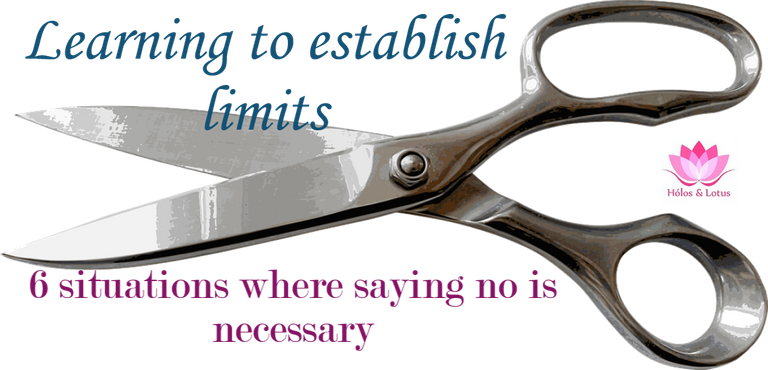

It is never too late to learn to say no or to activate denial in the face of circumstances or actions that definitely do not benefit us.
Well-being often depends on denying ourselves in the face of certain circumstances; but learning to say no or to activate what that word means is often difficult and even costs us a large part of our existence to achieve it.
On the other hand, it is never too late to learn to say no, to activate the necessary refusals in favor of our well-being; therefore, for this C/Holos&Lotus community where, in addition to initiatives, we create practical and relevant content in favor of our well-being in all areas of our existence, it is also necessary for us to dedicate time to no, as a word, as an act of strength and as a necessary action for our growth.


We find it difficult because there is a lot of external pressure
Often, saying no to social demands and suggestions from everyone around us is difficult.
And, we tend to be labeled as negative or selfish people, imposing limits, cutting with patterns and situations that force us to support even against our will.
If we say no in a systematic way, it is possible that we understand it that way; however, refusing requests that we do not want or that simply will not bring us positive consequences and, even more, that will leave us absolutely nothing; it would be the logical thing to do.
This is an important part of assertiveness, which we can implement in our lives by imposing correct limits.
How many times do we end up doing things for the welfare of others that leave us with no taste, confusion, problems, waste of time and even difficult circumstances, which in the long run, take us time to finish understanding and resolving them, simply because we do not know how to say no?
And it is not only about setting limits, containing attacks and situations that delay us, it is also about learning to say no to actions that we have learned and that do not serve us or that do not allow us to follow the path of evolution that every human being needs, deserves or deserves.
There are many fears for which we delay the action of the refusals or that we do not say no; and it is because we think that we are going to look bad, because we believe that we can damage, because we are afraid of giving a bad image and even make another human being feel bad in whom we have a pre-established image.
We have the belief that it is of certain height to please or to please people; but, it is important to understand that it does not depend on pleasing to be well or to please human beings.
That depends, only and exclusively, on our way of being and the values that we handle with our words and attitudes.
Honesty, for example; politeness, respect, tolerance and empathy towards others, are characteristics that make a person pleasing; not complacency.
Probably, there are still remnants of the strict ways in which past generations educated us, and, therefore, in a practically irremediable and automatic way, we tend to please, to keep quiet, to stop doing things for ourselves, to accept conditions, to not transform personality characteristics -attitudes and attitudes- that should be transformed.
However, I repeat, it is never too late to learn; and the importance of setting limits, acting on the basis of values and principles, socially and legally accepted, allows us to make more accurate decisions, to respect our values and desires, and, above all, that those decisions are in accordance with our needs and in favor of our welfare.
While we value and love and, therefore, respect, equally, with honesty; we are involving both actions, valuing and loving by setting limits, by saying no to ourselves and to others.
Teaching why we do not accept something or some circumstance can be a definite sign of self-esteem, self-love and love for others.

It is about fostering assertiveness, which is balance
When we say no to ourselves and our bad habits, or to another human being, against social pressure or pre-learned cultural reasons; against some action that does not suit us, we are talking about learning to communicate rights, express opinions and impose positions before life in an honest and clear way.
This necessarily leads us to have a level of respect for others, for the planet and, above all, for ourselves.
This is assertiveness: to understand that our rights are at the same level as the rights of others, and that, therefore, I do not harm because I understand that this harm can also happen to me.
By doing this, we understand, in a kind and direct way, that we have to defend our positions.
But there is also the counterpart: The advantage of having to work through our fears and insecurities to achieve the imposition of limits.
If some human being, or the desires of our organism and our tastes, which come from advertising and a fashionable lifestyle, make us feel the need to please or to please ourselves, this does not mean that we are obliged to do so.
Much less to not reason out the consequences of choosing to please another or to indulge socially and fashionably imposed tastes, and even to make choices simply because others have made them before or en masse.
Many cows eat hay, but that is no reason for us to do so.
For all of the above, it is important, from a practical point of view, that we study and analyze these 6 frequent and routine situations, in which not eating hay is extremely necessary for our well-being:

1.- No, to lose your identity
Under no circumstances, neither to impress others, nor to get a job, nor to please someone, nor for any reason that at that moment seems valid to us; we must prove to be what we are not.
If someone is going to be with us, he should do so with the characteristics we possess and with our living conditions.
If we are going to occupy a position and be accepted in that job, we must achieve it because of our knowledge and our personality.
There is nothing more difficult than keeping an acted character all the time.
When we begin to transform characteristics of our personality to please or achieve an accomplishment, we end up hooked in a series of complicated situations that progressively damage our goals.
Playing roles, or any role, will eventually be undermined by the true characteristics of our personality.
Being yourself will allow you to respect yourself more and, to the extent that this happens, others will respect you according to the limits you set (Laura Rodriguez, 04/11/2022 in: Why is it so important to learn to set limits).
Remember that you can become the best version of you, not something you are not:
<<No one is born predetermined to be submissive, this is learned gradually, "without realizing it". It is not a biological or hereditary question, it is a learned behavior and, therefore, modifiable.>>
Gualberto Buela-Casal
(Prologue to Walter Riso's book: A Question of Dignity: The Right to Say No. February 2002).
2.- No, to emotional decontrol
If there is something that the organism asks for and that your psyche asks for, it is freedom to express emotions.
That series of reactions, ideas, sensations and feelings that occur as a result of external and internal stimuli, that when they come out uncontrolled, as your mind would love; they are capable of getting us into a lot of trouble.
Emotional control should be one of the objectives of our growth.
Learning about emotional intelligence, knowing when to react and how to control your reactions, to keep your position, your objectives, your goals and even your silences or plans out of the reach of the opinion of others, except for your own opinion and evaluation.
Emotional control is important, because being at the mercy of emotions implies putting aside reasoning, which is the basis by which we create objectives, organize actions and even formulate goals with the purpose of achieving any achievement.
3.- No, to overspending
I believe that we all know the reasons why we must learn to say no, to act no, in these circumstances.
But, it seems that there is always something inside us that tells us that it is possible, that we should do it, that there is financing, that there is the credit facility.
Here, if we were quite concrete, regarding what we earn, the correct distribution of our expenses, and we had the ability to invest in what we should invest, such as education, mentoring, goods, to improve our quality of life; we would save a lot of stress.
Likewise, having a good savings culture to ensure difficult moments that we may go through, or simply the future; we would understand that this is one of the most important no's that we have to learn to exercise in ourselves: Stopping the exaggerated spending of money we do not have and getting into debt.
There are plenty of whys.

4.- No, by depending on someone, even if it is your partner
To form in us the mentality or inner culture, that we are responsible for our actions, for our training, for our professional specialization, for the service we provide; inevitably leads us to learn to value our work and to take care of the remuneration we receive for it.
It is true that when we begin to form couple relationships we become a team, but, what we should not think about when forming unions is to depend on the other.
I will be very clear from my point of view:
When we join goods to improve our subsistence we unconsciously begin to co-depend; and this brings consequences in our emotions and automatic behaviors.
These unconscious consequences are dependence, lack of freedom, restricting us from developing our own ideas and depending on others to make concrete decisions.
Therefore, contributing is more effective than joining, in the long run.
I repeat: This explanation is a very personal opinion of mine; and it is based on numerous interviews that, at the medical level and in the area of psychiatry, I have been able to observe; therefore, I understand that it is susceptible to being refuted.
But, in my opinion, no matter how much love, commitment and union -and always defending that the couple should be a team- both production and economic and affective dependence should be avoided in a couple or team.
You should never depend, neither on your partner, nor on someone else.
5.- No, to devaluing or giving away your work
This, first, is like an extension of the previous no; and it is based on what many nowadays defend by saying that you should not give away your knowledge or your work.
In medicine I have understood that many doctors, who know their profession very well and who have a high capacity for service, who, by the way, offer their knowledge and their consultations for free; tend to be less valued.
There are hundreds of articles that talk about that (Read Giving away your job has serious consequences December 2, 2020) and just to give an example.
Anyway, it is not necessary to place scientific studies and statistics to understand that everything that has cost a human being, in terms of time and economic resources, his training, should be enough reason to understand and demand valuation of his work.
6.- No, by always giving your opinion
A final no, for now, is: Do not meddle where you have not been called.
And this is a way of creating in us the caution; that has two points of view under which to be analyzed:
The first is the respect for the agency of the other. If you do not understand the decisions and actions of another human being, try to study or put yourself in his place to understand them, or at least have a similar point of view.
That, on the one hand.
And, on the other hand, try or respect the decisions of each one, because these depend on the experience and the valuations that the other makes; and each life, each lifestyle is different.
We cannot weigh and value gold based on the characteristics of silver.
And the second situation under which we can see this: Is that, generally, we tend to confuse the other human beings with our opinions and suggestions, because of what I said before, that all lives or vital processes are different and the worlds we live meet, but are not lived in an identical way.
And finally, because we simply should not be giving away our opinion where we have not been asked for it.
Let us wait for someone to ask us for our opinion to give it, if we can contribute something to improve or solve.

Let's get to work!
No, under no circumstances do I intend this to be a master class on social skills, assertiveness, ability to defend rights and thoughts.
Much less about the formation of empathetic and polite behavior; because this simply tries to seek benefits for our self-esteem, for the feeling of freedom, of choice.
When we are forming in us behaviors or mentality of, perhaps what today is called the psychology of the defense of the self; we are strengthening ourselves, overcoming fears, overcoming obstacles and defining our values and internal conditions.
The difficulties of saying no to an action that we know, or that may be doubtful as to the benefit it will give us, leads to courage, security and a feeling of empowerment when rejecting it by our own decision and will.
This is a "sine qua non" characteristic for us to live in today's complicated, globalized and exposed world; because our actions are exposed to everyone's view and are susceptible to be criticized, attacked and reformulated.
Those of us who write in social networks know what that can mean negatively.
Beginning to practice the psychology of the non-beneficial in our lives will allow us to observe ourselves, detect what we really want, defend it and avoid acting negatively on others, as well as prevent others from interfering with our progress, wellbeing and understanding.

Clarifications:
This list is my own; according to the order that, as a doctor, has seemed to me the indicated one; but there are, on the net, treatises and studies on ways to defend your decisions, impose limits and learn to say no.
The problem is that because it is obvious, we stop working on it and remembering it, hence my interest in making this brief list.I also suggest further reading, such as:
The importance of knowing how to say "No". In: gabinetpsicologicmataro.com -2022-
The importance of learning to set limits. At: Expresa Salud Emocional -2022-
Assertiveness - the importance of knowing how to say "No". In: psicoglobal.com -2016-Again, I recommend the book:
A Matter of Dignity: The right to say no. By the popular writer Walter Riso

Emilio Ríos – Venezuela
@emiliorios

Barras separadoras y logo de English editado en Paint, de:
Separator bars and English logo edited in Paint, by:
Pixabay- Kranich17Dibujo de Agradecimiento Final editado en Paint, de:
Final Thank You Drawing edited in Paint, by:
Pixabay- OpenClipart-VectorsTe invitamos para el evento en Caracas (Solo español)
We invite you to the event:
Programación de nuestro evento: "Proyecta tu 2023 y potencia tu talento en la Web3"
Las coordenadas para este evento:
🌸Fecha: 17/12/2022
🌸Hora: 09:30 a.m. a 03:30 p.m.
🌸Lugar: Los Chorros – Caracas.
🌸Inversión: 6$.
Para reservar tu cupo debes llenar el formulario de registro en este enlace:
https://www.eventbrite.com/e/proyecta-tu-2023-y-potencia-tu-talento-en-la-web3-tickets-481373369707

- Visítame también en:
Visit me also at:
C/Be Entrepreneur




En ocasiones, el que se niega a hacer algo, incluso si la negativa es razonable, es señalado como "el malo", a pesar de que en realidad puede que el problema no tenga nada que ver con él.
Por cierto, ese último no si es bien importante, hay que aprender a no meterse en donde uno no tiene que meterse :)
!ALIVE
!LOLZ
!CTP
Qué pena con este no, pero es verdad; damos la opinión en todo en la vida y a veces complicamos.
Algo que no sucede aquí, pues las opiniones y comentarios abren aristas al conocimiento expuesto.
Recibe mis saludos @pedrobrito2004 y mi agradecimiento por tu apoyo de siempre.
You Are Alive so I just staked 0.1 $ALIVE(6/10)@emiliorios! to your account on behalf of @pedrobrito2004.
The tip has been paid for by the We Are Alive Tribe
 through the earnings on @alive.chat, feel free to swing by our daily chat any time you want.
through the earnings on @alive.chat, feel free to swing by our daily chat any time you want.
Dios mio! ESTE POST ES SIMPLEMENTE MARAVILLOSO!!!!
El ser dependiente monetaria o afectivamente es algo fatal. Pues en algún punto comienza a hacer mella en el autoestima y terminas dejando de ser tu, para ser una especie de anexo del otro.
Igualmente, decir una opinión que no se ha pedido, si no aporta, es mejor no hablar. Inclusive, así sea algo positivo, decir de antemano "te gustaría saber que pienso sobre esto", "puedo aportarte algo al respecto" será mucho mejor recibido que si te largas de plano a decir lo que piensas.
BRAVO!!! ME QUITO EL SOMBRERO!!!
Gracias @mamaemigrante por estas plabras!
Aprender a decir que no "de manera razonable", saber poner límites es un aprendizaje que puede llevarnos tiempo y quizás muchos sinsabores, pero a la larga es comprender que el respeto a uno mismo bien vale el esfuerzo.Buenas noches @emiliorios una material de gran valor, el que nos traes hoy. Esas seis situaciones que nos colocas y que describes de manera excelente son fundamentales para mantener o potenciar nuestra autoestima.
Gracias por compartir. Saludos. 😊
Seguimos educando en lo posible en esta excelente comunidad que amo.Muchas gracias @damarysvibra
The rewards earned on this comment will go directly to the people sharing the post on Twitter as long as they are registered with @poshtoken. Sign up at https://hiveposh.com.
Thanks a lot @poshtoken
Congratulations @emiliorios! You have completed the following achievement on the Hive blockchain And have been rewarded with New badge(s)
Your next target is to reach 20000 upvotes.
You can view your badges on your board and compare yourself to others in the Ranking
If you no longer want to receive notifications, reply to this comment with the word
STOPCheck out our last posts:
Hola amigo @emiliorios este es otro gran material que nos traes. Es muy importante transmitir la importancia del valor propio que debemos tener ante las personas y el mundo en general. Esto es algo que debemos aprender y practicar para mantener posiciones, principios y hasta cultura. Claro, que cada cabeza es un mundo y la vida suele verse desde lentes diferentes pero esa diversidad no debe existir para hacer presión negativa. Cada quien viva con respeto propio y así seremos capaz de respetarnos todos, manteniendo una identidad y los valores propios donde quiera que estemos.
Un abrazo sincero y virtual 💙